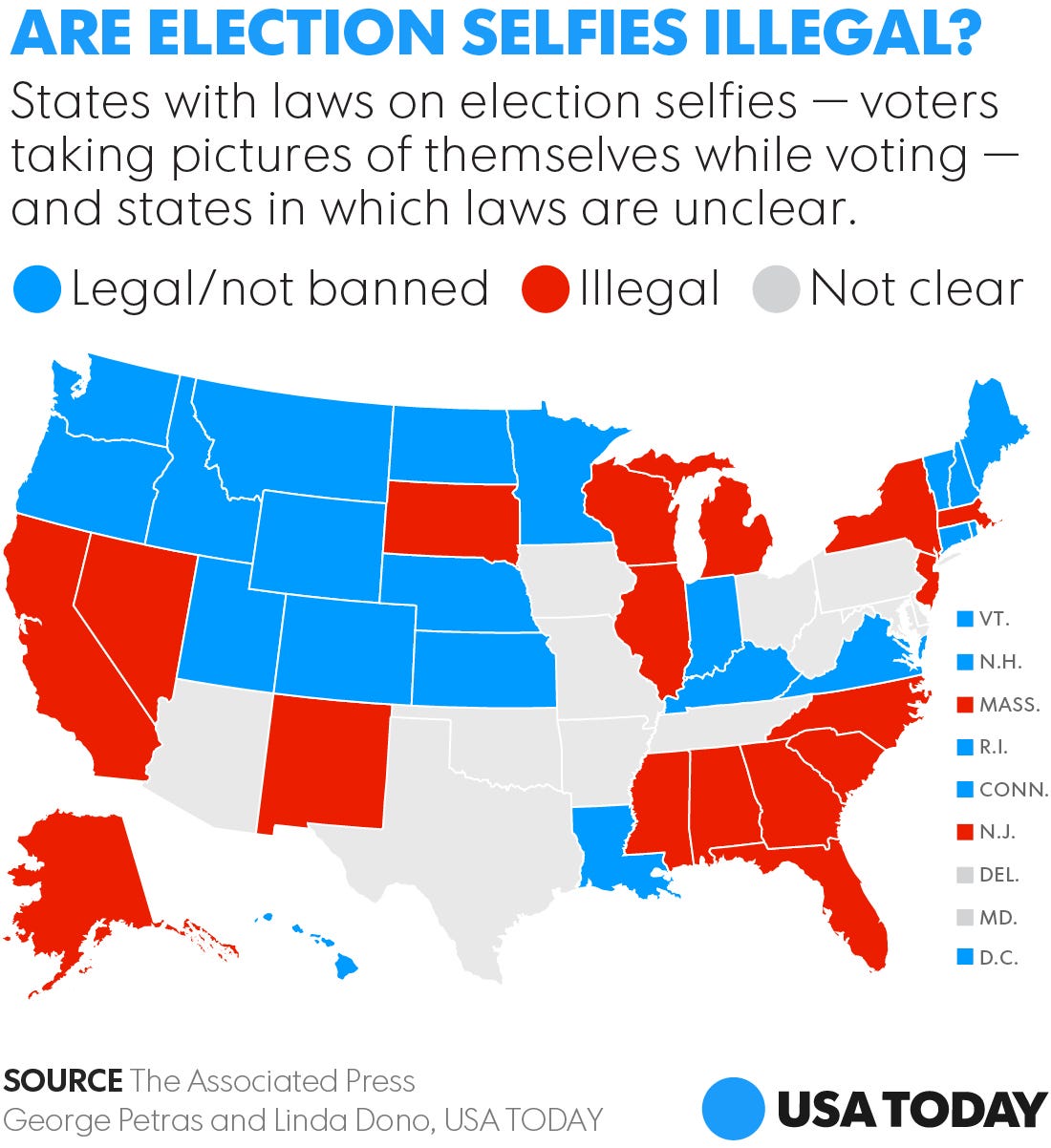WASHINGTON — Jim Condos, the secretary of State for Vermont, has a clear message for young voters. Yes, it’s “perfectly legal” to take ballot selfies on your smartphone in the Green Mountain state on Election Day. “Just in case that was keeping you up at night.”
Vermont is one of about 20 states, plus the District of Columbia, where showing yourself off in the election booth with a finished ballot and sharing it on social media is accepted as a reality of the mobile age.
In slightly fewer, however, it’s not allowed, while laws in states like Arizona, Texas and Ohio are unclear, according to an analysis by the Associated Press that's been updated by a recent flurry of state decisions that clarified rules in the past two weeks.
While some states have penalties, including New York and Illinois, the bans on photo taking in the booth have rarely been enforced. Arrests — if police made any — haven’t been widely reported, and local law enforcement usually deal with more pressing issues when snapped photos are discovered online.
Questions, lawsuits and late-show ribbing reflect the new twist in this year’s election cycle. Young voters, who often share many, many details of their daily lives, are getting into the spirit of the campaign by posting photos of themselves in and around the voting booth.
This is a just another reminder that this election cycle is unlike any from years past, marked by the power of social media, which has allowed candidates to rally voters and trade barbs without the filter of traditional media, and led to record engagement around political events on Facebook and Twitter.

Just as the election itself is contentious, so is the debate about whether or not to allow photos in the privacy of the voting booth, and the ballot itself.
Every citizen “has a right to keep their ballot private, but people who want to share it should have that right too," says Michael Risher, a senior staff attorney for the ACLU of Northern California, who says the ballot selfie is a first amendment issue.
Katie Moore of Los Angeles was an early voter last week, but unlike many young citizens, she wasn’t planning to shoot a selfie of herself in the voting booth. A simple photo of herself with the “I Voted” sticker outside the election area was suffice for social media.
The selfies practice “encourages people my age to vote,” she says. It’s the digital equivalent of the “I voted,” sticker, Moore adds.
Entertainer Justin Timberlake brought the issue of ballot selfies into the national dialogue after he recently snapped a photo of himself in a Tennessee voting booth andposted it on Instagram — thus violating state law.
State officials said they wouldn’t pursue legal action.
But just in case some zealous prosecutor wanted to make headlines by going after selfie offenders, lawyers and even communication app Snapchat have lobbied for legal changes in favor of smartphoneography.
Several courts had to deal recently with requests to overturn pre-existing laws that prevented the showing of a completed ballot. The restrictions stem from concerns photos of marked ballots could be used for vote buying, as proof a person voted for a certain candidate.
The ACLU petitioned the state of California to allow ballot selfies this year since a law allowing the sharing of a completed election ballot doesn’t become effective until Jan. 1. A judge denied the injunction.
In Kansas, however, elections officials took a second look at the law governing photos of ballots and decided that it pertains to election officials, not voters — meaning it's OK to take a ballot selfie in the state. In Colorado, a judge ruled it's OK to share the contents of a ballot, but not take photos in the polling place.
Communications app Snapchat, which popularized the practice of selfie photographs, filed an amicus brief earlier this year urging the legalization of ballot selfies in New Hampshire
The company said selfies were “how voters — particularly young voters — engage with the political process." A federal appeals court in New Hampshire ruled for the young photographers.
Bottom line? Ballot selfies “should be legal,” says Michelle Velasco, 19, a student at the University of California-Los Angeles. “As long as you post just yourself and don’t put anyone else in the shot.”



